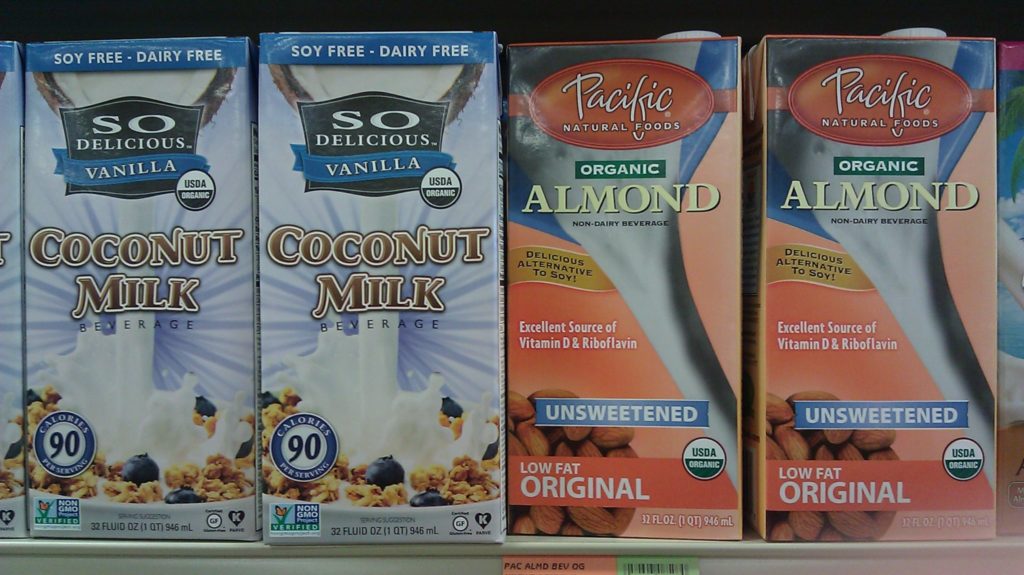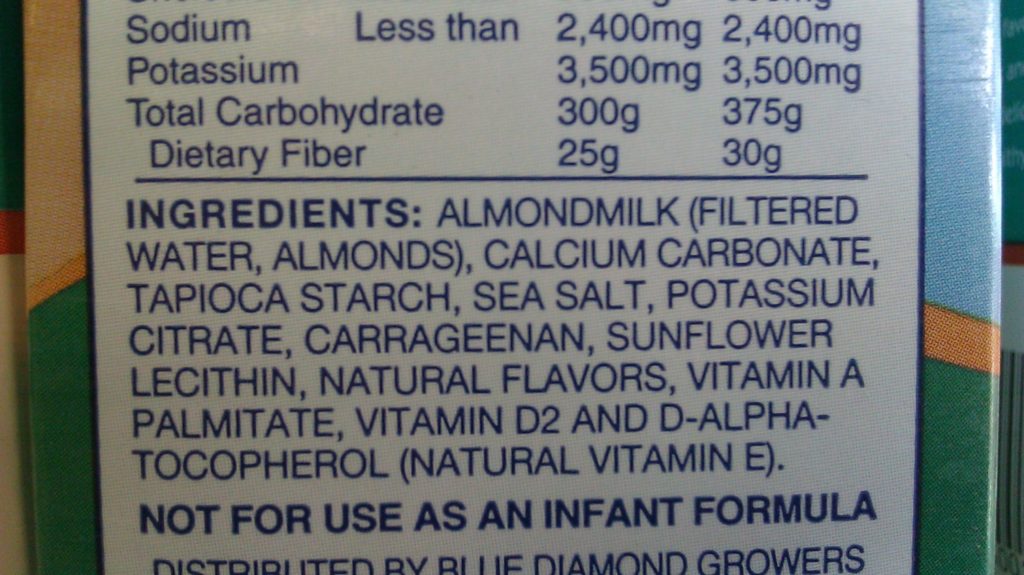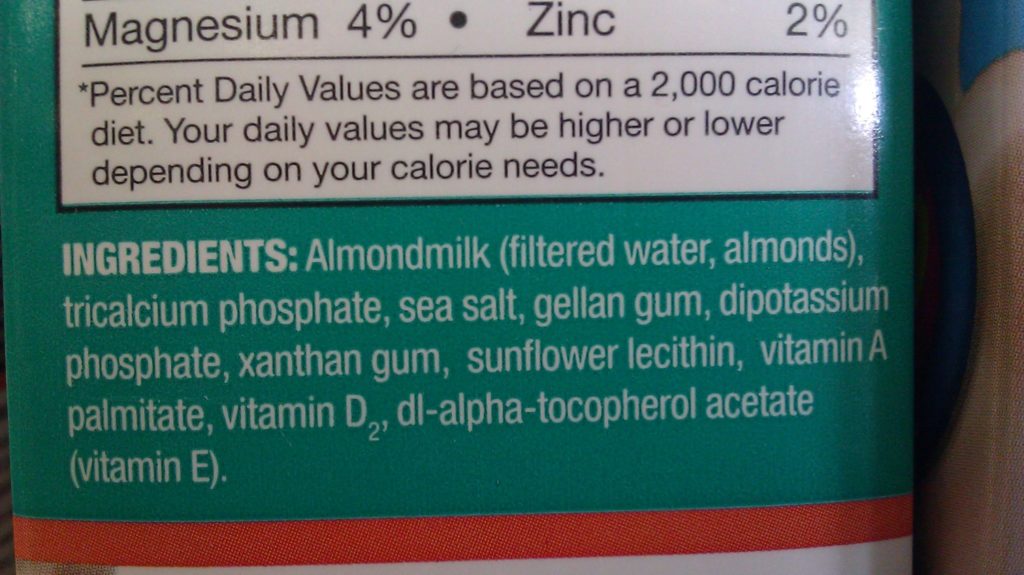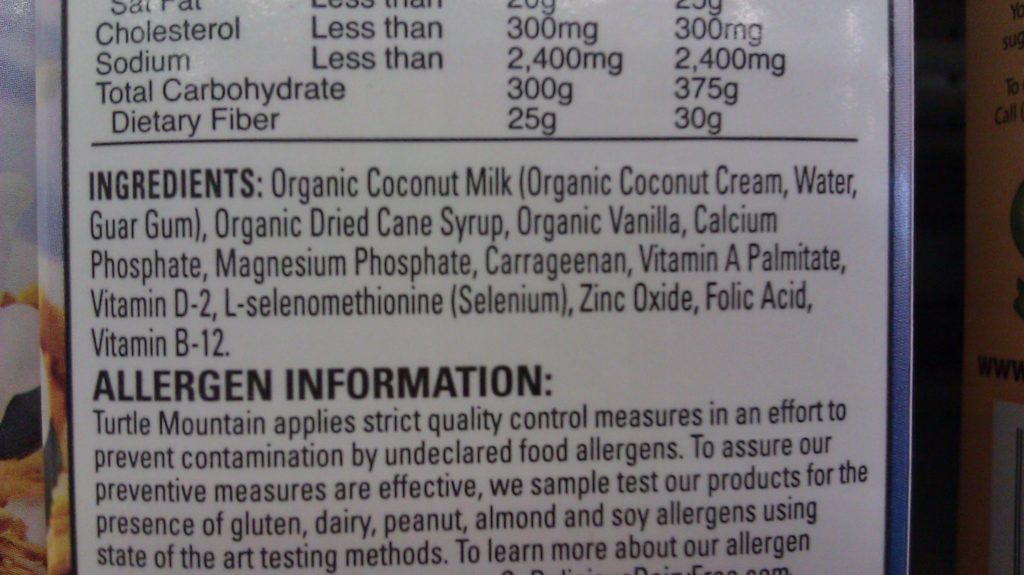 Organic coconut milk and almond milk are common purchases at the health food store by those with dairy allergies. Usually, these people are savvy consumers who know enough nutritionally to avoid soy milk with its endocrine disrupting isoflavones and gastric inflaming phytates. Rice milk is also steadily declining in popularity as it is really not much more than a glass of sugar water nutritionally speaking.
Organic coconut milk and almond milk are common purchases at the health food store by those with dairy allergies. Usually, these people are savvy consumers who know enough nutritionally to avoid soy milk with its endocrine disrupting isoflavones and gastric inflaming phytates. Rice milk is also steadily declining in popularity as it is really not much more than a glass of sugar water nutritionally speaking.
Organic, unsweetened coconut milk and almond milk in cartons seem like great alternatives at first blush, but are they really as “healthy” as people believe?
Let’s take a look at the labels. I was shocked at what I found.
Check out the labels of the three brands I photographed. I checked all the brands, by the way, and they all contained the same dangerous additives I’m about to describe.

First, Vitamin A Palmitate is added, the synthetic version of Vitamin A. I personally avoid synthetic versions of Vitamin A like the plague. Every single multi-vitamin I’ve ever examined contains some form of synthetic A, including the so called “whole foods” multis.
Synthetic vitamins are the chemical mirror images of the real, natural versions. They can cause imbalances over time. Even small amounts of the synthetic fat soluble vitamins like Vitamin A can prove toxic and should be strictly avoided!
The Organic Consumers Association warns that isolated vitamins such as those produced synthetically cannot be recognized or metabolized by the body in the same way as the natural version.

Large doses of natural vitamin A are well tolerated by the body as established by researchers decades ago, however. Traditional diets contain 10 times or more of the RDA of this nutrient with no ill effect. However, synthetic vitamin A is associated with birth defects and bone fractures. It has no benefit in the diet whatsoever.

The second really bad additive in these organic cartons of coconut milk and almond milk is Vitamin D2. Vitamin D2 is a form of the wonder vitamin that you should take great pains to avoid.
In all known cases of Vitamin D toxicity where the dose was intentional, Vitamin D2 was the culprit. By comparison, Vitamin D3 is much less toxic and requires an enormous or even an accidental dose to produce any toxic effect.
Vitamin D2 is manufactured industrially by irradiating yeast. It is dangerous for D2 to be added to any food product particularly if this product would be given to children, where toxicity symptoms would appear at much lower dosages.
None of the store brands of cartoned coconut milk or almond milk were free of these dangerous and synthetic versions of the fat soluble vitamins!
Notice also that carrageenan is present in 2 of the 3 products as well! Dr. Andrew Weil has been telling people to avoid carrageenan since 2002.
Carrageenan is so toxic and inflaming to the human digestive system that this food additive is formally classified by the International Agency for Research on Cancer (part of the World Health Organization) as a potential human carcinogen.
In my view, it would be a mistake to purchase and consume these items. They are in no way health promoting or beneficial, particularly for growing children!
Healthy Alternatives to Coconut Milk and Almond Milk in Cartons
Coconut milk and almond milk should be healthy and they can be if they are produced at home without these dangerous additives. I wrote an in depth post on how to easily make these nondairy beverages yourself. This recipe for wild rice milk is a good option as well.
Believe it or not, even organic coconut milk in BPA free cans would be a better alternative to cartons of coconut milk based on my label inspection!
Check out my video on homemade coconut milk and my article on how to make healthy DIY almond milk, fermented to add probiotics and enzymes to boost immunity and improve digestion.
Sarah, The Healthy Home Economist
Sources
From Seafood to Sunshine: A New Understanding of Vitamin D Safety







@Judy just checked shaklee’s multi for women and it contains vitamin A acetate which is synthetic.
almond milk in 3 easy steps: 1. soak 1 cup of raw almond over night.
2. rinse the almond, combine with 3 cups of water in blender.
3. strain with cheese cloth and add sweetener if u wish.
@ Chet yes the other additives are no good either!
Chet Kan, thanks for posting this. You beat me to the punch. Sarah’s link to MSG had this ingredient on the list as well. Sadly, it is in almond yogurt too.
Sarah, some of the brands are in Tetra Paks. They are lined with plastic. Who knows if the plastic is leaching into your milk?
carrageenan is also bad news.
I have been making my own fresh almond milk for almost 4 years, the kids love it and we don’t have to worry about any of those yucky additives.
I have just started making it in the last month. But, I have noticed it going bad quickly. Any suggestions for lengthening the shelf life?
Standard Process doesn’t want to put the vitamin A palmitate in there but it has to as required by the FDA. Just one more reason never to take multi’s or even prenatals.
All multis have synthetics in them, even Standard Process. The FDA requires it if the company has a claim for vitamin A or D on the label.
Sarah, how about the Innate Response brand? From what I understand all of the theirs is food grown nutrients. innateresponse.com
not that I take multis, I was just curious.
That’s disturbing to hear about Standard Process…. why don’t they just take off the claim of A or D listed on the label and allow it to be in the product through the ingredients without disclosing it? Obviously if you saw liver on the ingredient list you would know that it contained A and D.
Yes, why not? I was pushed to take the Standard Process multi (Catalyn or something like that was the name) when I was pregnant,. Excellent ingredients except for that nasty synthetic A. I refused to take it.
What about Nutriway, that are produced on a certified organic farm?
Nope. Synthetic A. They are ALL like this. I’ve never seen a single exception IF the product claims to be a multi vitamin.
So, I am just confused following the comment stream. If a whole foods multi lists vitamin a (as beta carotene) it isn’t synthetic, but isn’t vitamin a either?
Check out Shaklee’s multi’s – no synthetics –
This drives me crazy every time I walk past the shelf and am tempted by a good sale to buy some. Honestly I just can’t replicate the coconut milk in a carton at home. My homemade coconut milk from dried coconut separates when it sits out for fermenting or is refrigerated. I’ve even used an empty carton and added a can of coconut milk and some water. It’s acceptable but even then I have problems with chunks of coconut oil. If you have any tips to make homemade a little more like the carton milk I’d love to hear them. For the time being I buy it only very occasionally and frequently complain to So Delicious about the addition of yucky synthetic vitamins 🙂
I use Arroy-D brand in 1L BPA-free TetraPak. I think it’s a Cambodian product. Ingredients: Coconut. Water.
I just found this brand at my local Asian market. $1.25 a can. Yippie!! This is the only brand that I have found to date that has ONLY these ingredients: coconut extract, 60% water. So excited since all the other brands that I have found have so many more ingredients! Time to stock up I would say
Check out the ingredients in some of the organic almond milk and coconut milk sold in cartons: http://t.co/NQaR6fhc